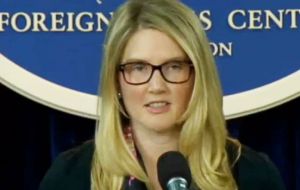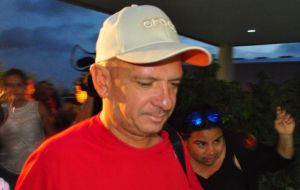MercoPress. South Atlantic News Agency
US imposes travel restriction on a number of Venezuelan officials
 The US spokesperson said the restrictions were in response to “arbitrary detentions and excessive use of force” by Venezuelan officials
The US spokesperson said the restrictions were in response to “arbitrary detentions and excessive use of force” by Venezuelan officials  The decision is believed to be linked to the recent incident in Aruba, when Venezuelan intelligence general Carvajal was detained but later released
The decision is believed to be linked to the recent incident in Aruba, when Venezuelan intelligence general Carvajal was detained but later released The United States is imposing travel restrictions on a number of Venezuelan officials. Washington did not specify how many people would be affected, but said those “who have been responsible for or complicit in human rights abuses” would not be “welcome” in the US.
The Venezuelan opposition has been lobbying for sanctions since thousands of protesters were detained during anti-government protests.
At least 43 people were killed in the protests. The victims were from both sides of the political divide.
Relations between the US and Venezuela took a turn for the worse on Sunday when the former head of Venezuelan military intelligence, General Hugo Carvajal, was released from custody in the Caribbean and given a hero's welcome in Caracas.
General Carvajal had been detained on the Dutch Caribbean island of Aruba over US accusations of drug-trafficking activities. The US Treasury said he had been protecting drug shipments by Colombian FARC rebels. He was released after Venezuela claimed he had diplomatic immunity because he had been appointed as Venezuela's consul in Aruba.
The US said his release was “deeply disappointing” and accused Venezuela of threatening Aruba and the Netherlands into freeing General Carvajal.
In a statement released on Wednesday, US state department spokeswoman Marie Harf said the travel restrictions were in response to “arbitrary detentions and excessive use of force” by Venezuelan officials as they tried to contain growing anti-government protest.
Hundreds of thousands of Venezuelans took to the streets in February and March in protest at skyrocketing inflation, high crime rates and shortages of some basic staples. President Maduro accuses the opposition of trying to overthrow the government at the bidding of the US. Key opposition figures behind the protests were arrested and have been charged with inciting violence.
Thousands of protesters were detained, many of them have since been released but there have been allegations they were intimidated, beaten and even tortured. The Venezuelan government says it is investigating dozens of members of the security forces in connection with the allegations.
The demonstrations have since become smaller and less frequent but tensions in the deeply divided country remain high.




Top Comments
Disclaimer & comment rules-

-

-

Read all commentsI do hope this is but the first step in the US going into Venezuela at the request of the opposition to help them rid the country of these Chavistas once and for all.
Jul 31st, 2014 - 11:31 am 0The U.S. won't go in.
Jul 31st, 2014 - 12:20 pm 0@ 2 ElaineB
Jul 31st, 2014 - 04:19 pm 0I did say 'hope'.
Commenting for this story is now closed.
If you have a Facebook account, become a fan and comment on our Facebook Page!